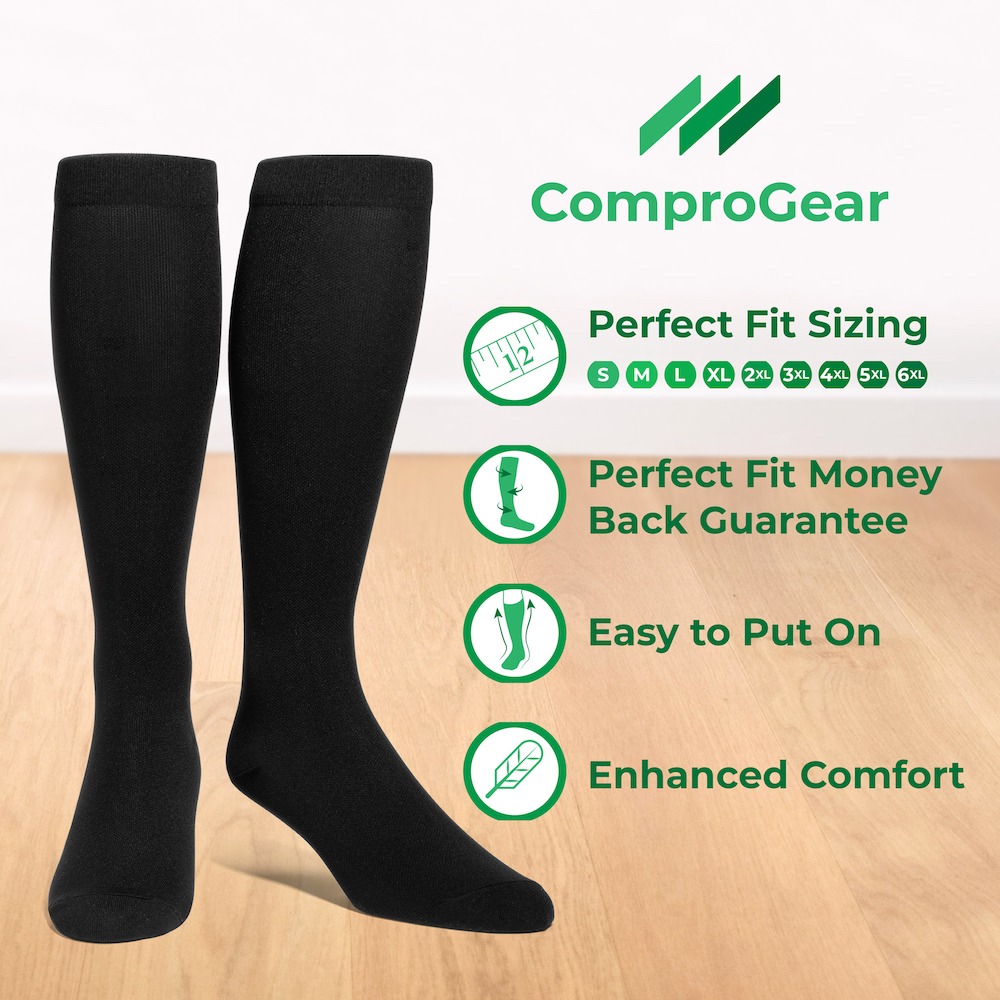How long you should wear compression socks (aka compression stockings) depends on many factors. The short and quick answer to this question is — it depends!
Wearing compression socks can provide a host of benefits to people who suffer from all sorts of ailments.
Whether you need to wear them for the long- or short-term, or wear them sporadically as needed or regularly, and how long you should keep them on depends on the ailment or condition you’re trying to alleviate.
You shouldn’t be wearing them if they’re causing you discomfort or pain.
Below are some helpful insights on how long you should wear your compression socks for different situations…
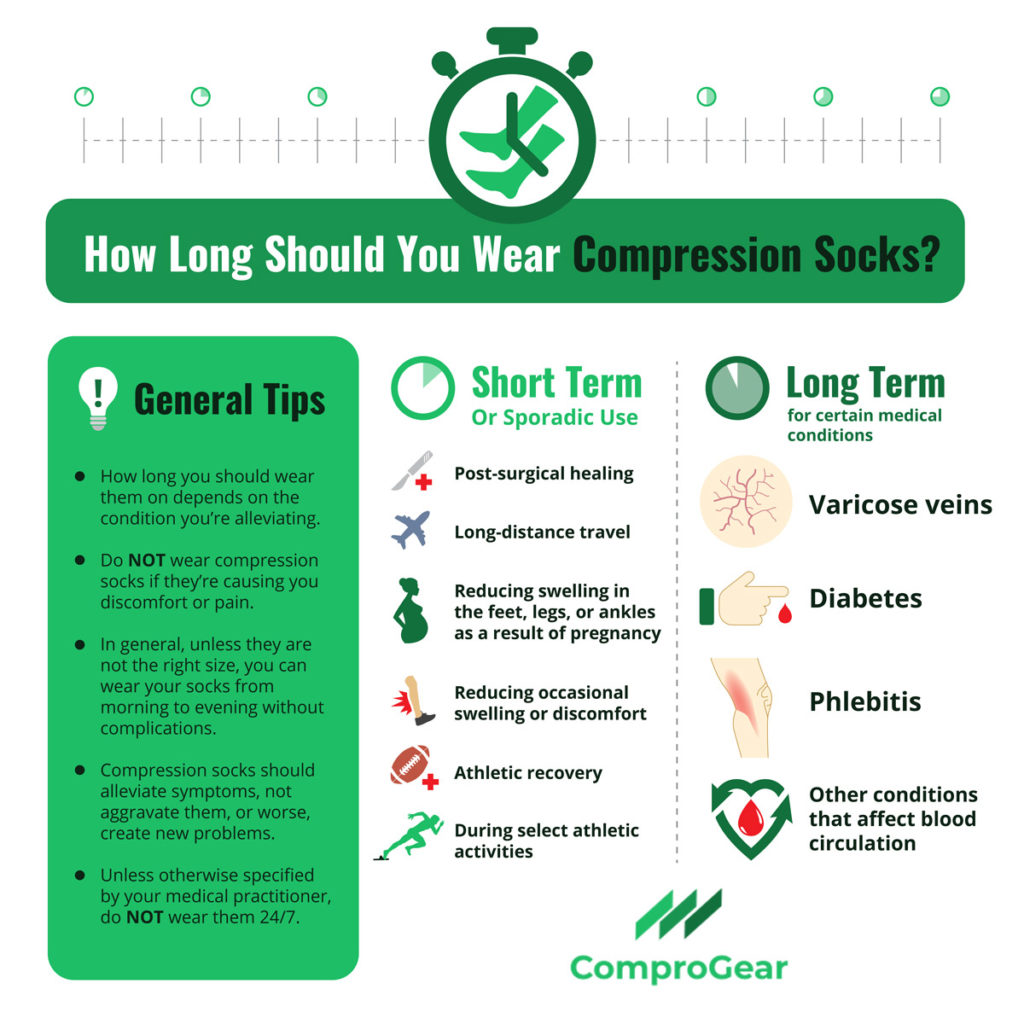
What are Compression Socks and How Do They Help Me?
Compression socks help improve blood circulation. Often recommended by doctors to aid blood circulation, compression socks are an effective, safe, and inexpensive alternative for managing blood circulation.
Wearing compression socks help reduce the risk of blood clots and lend your veins some much-appreciated support.
They help reduce swelling in the legs, feet, and ankles.
In medicine, for example, they are commonly used to help manage post-surgical swelling.
When Should I Wear Compression Socks?
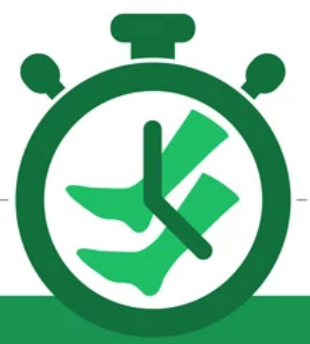
There are many occasions when it is a great idea to wear compression socks, such as when you know you will be sitting for long periods. Remaining seated in the same position for an extended amount of time can sometimes cause blood clots or lead to swelling in the lower extremities (due to blood pooling).
For example, consider wearing compression socks on a long international flight. You might get stuck in a window seat and will be unable to move around! If your job requires you to sit for large portions of the day, then you can even consider wearing compression socks to work.
Nurses who are up and about, meanwhile, can also benefit from using compression socks. Athletes and pregnant mothers are still others who should consider wearing them.
General Info on Wearing Compression Socks
Commonly, you would wear compression socks throughout the day. But when should you take them off? The answer varies among individuals. However, you should ALWAYS take off your compression socks if they are causing you pain.
In general, unless they are not the right pair, you can wear your socks from morning to evening and take them off for bedtime without complications.
Remember, however, that compression socks alleviate symptoms, not aggravate them, or worse, create new problems. If your socks cause discomfort, then you will want to inform your doctor. Consider getting a professional fitting so that you can safely benefit from wearing compression socks.
Another rule of thumb to follow, unless otherwise specified by your medical practitioner, is not to wear them 24/7. In most cases, you won’t need to wear your compression socks to bed at night.
Since circulation is already optimal when supine, the compression socks are rendered nearly redundant. Unless specified by your doctor, and there may be some exceptions, you should avoid wearing them while sleeping.
Popular Articles on ComproGear
Compression Socks for Men comprogear.com/compression-socks-men/
Plus Size Compression Socks comprogear.com/plus-size-compression-socks/
Best Compression Socks for Nurses comprogear.com/best-compression-socks-for-nurses/
Wide Calf Compression Socks comprogear.com/wide-calf-compression-socks/
What Are The Best Socks For Circulation comprogear.com/what-are-the-best-socks-for-circulation/
Compression Stockings mmHg Chart comprogear.com/compression-stockings-mmhg-chart/
How To Buy Compression Socks comprogear.com/how-to-buy-compression-socks/
Who Should Wear Compression Socks?
- People who regularly experience swelling in their feet, legs, or ankles
- Pregnant women
- Athletes
- People who are recovering from surgery
- People who suffer from disorders that affect the circulation
- People who are sitting or standing for long periods
- People who are on a long airplane flight (3 hours or more) or in a situation where they are sedentary for a lengthy period
- People with diabetes
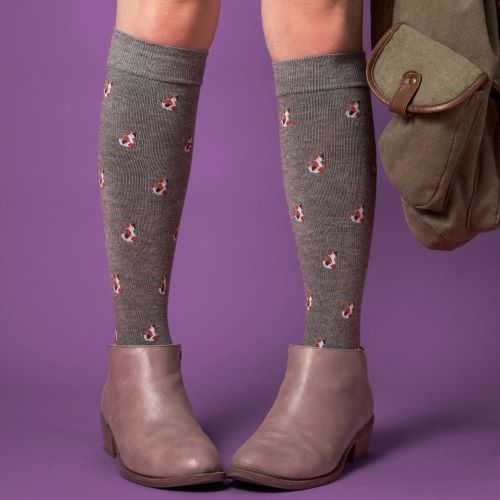
What Symptoms Do Compression Socks Help Alleviate/Prevent?
- Swelling in the feet, legs, and ankles
- Poor circulation
- Deep vein thrombosis (DVT)
- Achy legs
- Blood clots
- Post-surgical complications related to clots/circulation
- Soreness after physical activity
- and more!
Compression Socks for Long-Term Users
Long-term use of compression socks will apply to people with medical conditions such as:
- Varicose veins
- Diabetes
- Phlebitis
- Other conditions that affect blood circulation
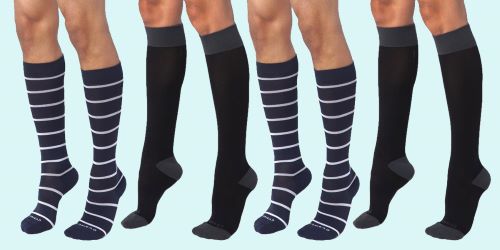
People who require long-term therapy using compression socks will usually wear compression socks from morning until night. Some may even be required to wear compression socks almost 24/7.
Compression Socks for Short-Term Users
Short-term use of compression socks will apply to people who are using compression socks for the following conditions:
- Post-surgical healing
- Long-distance travel
- Reducing swelling in the feet, legs, or ankles as a result of pregnancy
- Reducing occasional swelling or discomfort
- Athletic recovery
- During select athletic activities
For short-term users of compression socks, the maximum amount of time for wearing compression socks may vary. You usually will not need to worry about the length of time you use compression socks unless they are causing you discomfort.
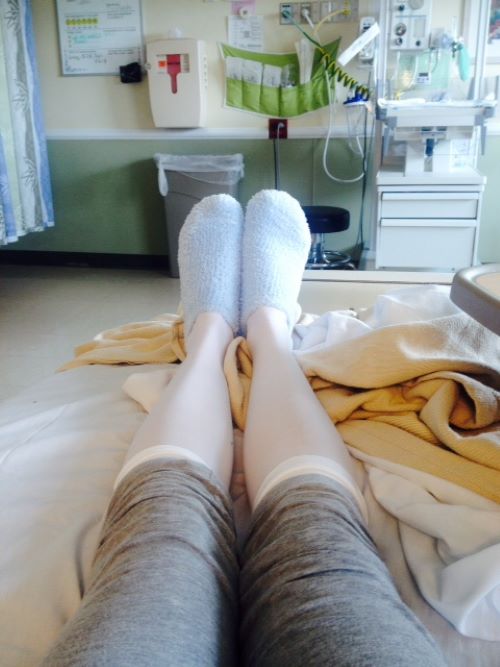
How Long Should I Wear Compression Socks in the Long Term?
As previously mentioned, the answer is it depends on your reason for wearing compression socks. You might end up wearing the socks for years or even the rest of your life. For example, to prevent varicose veins, you may need to wear the socks religiously for them to have the desired effect.
To treat the occasional swelling, however, you can adjust your use of compression socks accordingly. On some days, you may not even need to wear them. On days when the swelling is quite severe, however, you will want to wear your compression socks throughout the whole day.
Short-term or Sporadic Use of Compression Socks
You will need to use your compression socks on a short-term or sporadic basis if you fall into the following categories:
- Engaging in athletic activities or need to recover from an athletic activity
- Traveling or sitting/standing (stationary for long periods)
- Managing pregnancy symptoms
- Treating occasional swellings in the legs, feet, and ankles
Compression Socks for Athletes
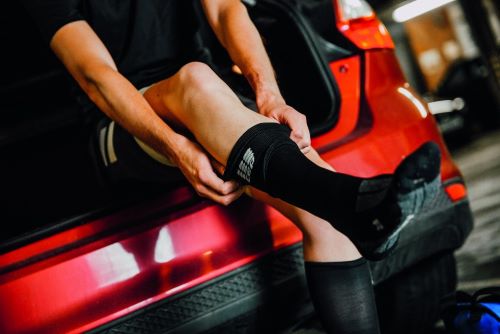
The main benefits you will get from wearing compression socks post-activity are:
- Reduced swelling
- Increased blood circulation
- Less muscle soreness in the days following the activity
Since compression socks help increase blood circulation, they also help increase the amount of oxygenated blood traveling to the muscles.
Your muscles need oxygenated blood to recover. Wearing compression socks might help you combat the lethargic, achy feeling you feel the day after a big workout. Some athletes might even use compression socks while engaged in their respective sports; others might use them as a post-activity recovery tool.
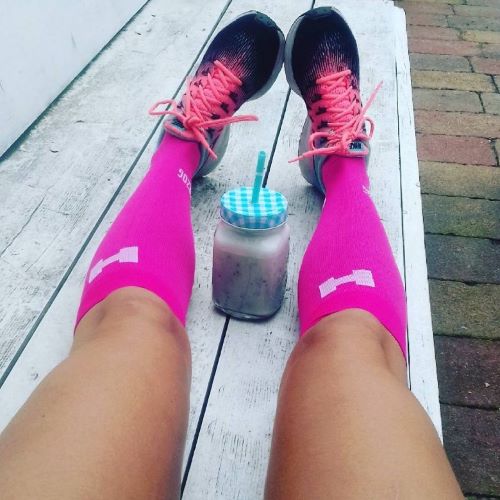
Cyclists and runners commonly use compression socks, and usually when engaged in longer distances. Though less common, basketball players and triathletes also use compression socks. However, compression socks are more effective as a tool to recover from aches rather than as a performance enhancer.
Compression Socks for Travel
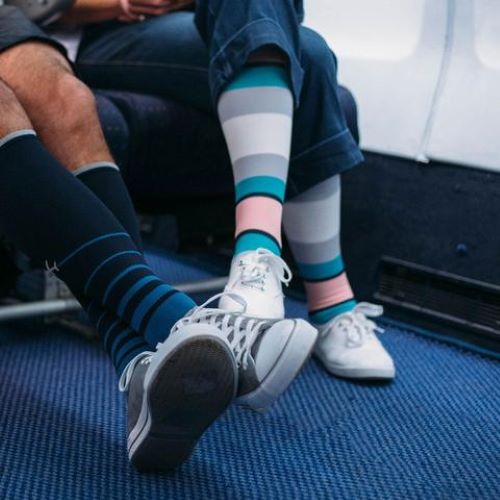
For those without underlying medical conditions, using compression socks during long-distance travel is a boon. Any flight or extended period of travel longer than 3 hours would merit the use of compression socks.
Compression Socks for Pregnancy
Although not necessary for the entire pregnancy, pregnant women can use compression socks to combat two common side effects of pregnancy – swollen feet and varicose veins. They, however, need to consult their doctor when using compression socks.
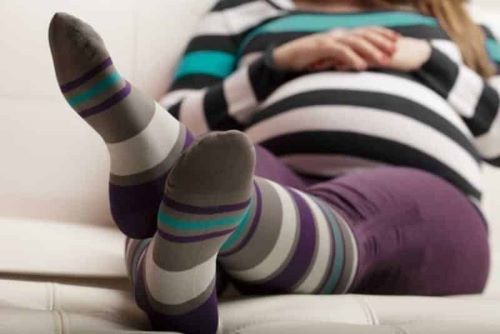
Compression Socks Post-Surgery: How long to wear them?
Each case will vary depending on your circumstances. For example, it will depend on the type of surgery you had. Only your doctor should give you precise directives regarding your use of compression socks after surgery and for how long.
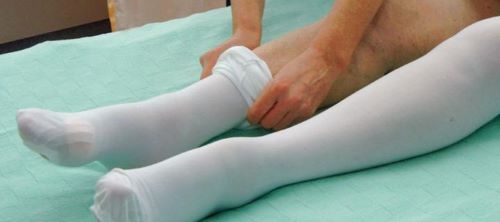
When Don’t I Need to Wear Compression Socks?
There will be times you will not need to wear compression socks. When at home, for example, you can put your feet up while sitting on the couch. Doing this should alleviate any swelling.
You also don’t need to (and shouldn’t) wear compression socks when you are in the shower, in the bath, or going swimming!
Wear your Compression Socks Correctly!
There are rules to follow when wearing your compression socks. If you wear them incorrectly, they will not work their magic at all. Keep in mind that they do not work instantaneously, and how you wear them depends on your circumstance.
When treating a chronic issue such as varicose veins, for example, you will want to be quite religious about your use of compression socks. You will only see an improvement if you wear them consistently. Using your compression socks a couple of times a week will probably not make a difference.
If your doctor has instructed you to put your compression socks on first thing in the morning, be sure to do so. If you wait and put your socks on later in the day, you may find that your legs have already swelled, and the socks will be difficult – or impossible – to put on.
When traveling, don’t wait until you’re halfway through your 8-hour flight to put them on. By then, your feet might already be too swollen, and the benefits of wearing compressions socks will be much less than if you had worn them for the full duration of the flight. Besides, it might be difficult or impossible to put on, and putting on your compression socks inside an airplane becomes an exhausting task.
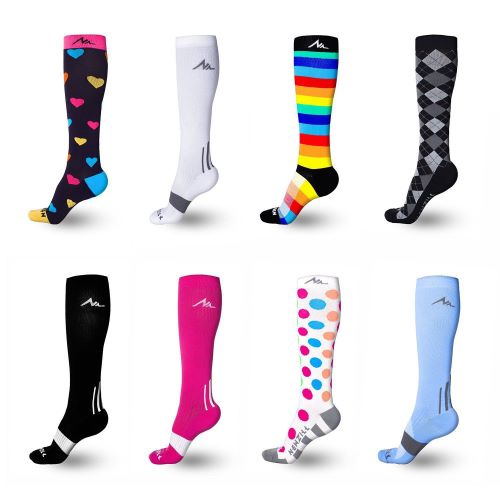
Potential Negative Effects of Wearing Compression Socks for Too Long
When we say “too long” in this section, we refer to the daily wear of compression socks. Here’s an overview on the side effects of wearing compression stockings (if you keep your compression socks on for too long.)
Side effects are likely to occur if you are wearing socks that are too loose or too tight. Possible effects include:
- Tingling feet
- Loss of circulation
- Corns and calluses
- Itching
- Joint pain in knees
Properly fitted socks can eliminate these symptoms. To avoid the tingling sensation or loss of circulation, make sure that your socks are not too tight by having them measured by a professional!
To prevent itching, you should make sure that you change and wash your socks daily. You can also consider getting some powder that helps soothe the skin. Use breathable pants/shoes as well whenever possible.
Committing to a Schedule
When you do start wearing compression socks, you will want to maintain a consistent schedule. Regular use of compression socks is necessary to see its benefits. Wearing them sporadically likely will not resolve your ailments.
A best practice is to consult your doctor when it comes to your compression sock schedule. Your doctor can help you determine how long you should be wearing them and for how long each time.
